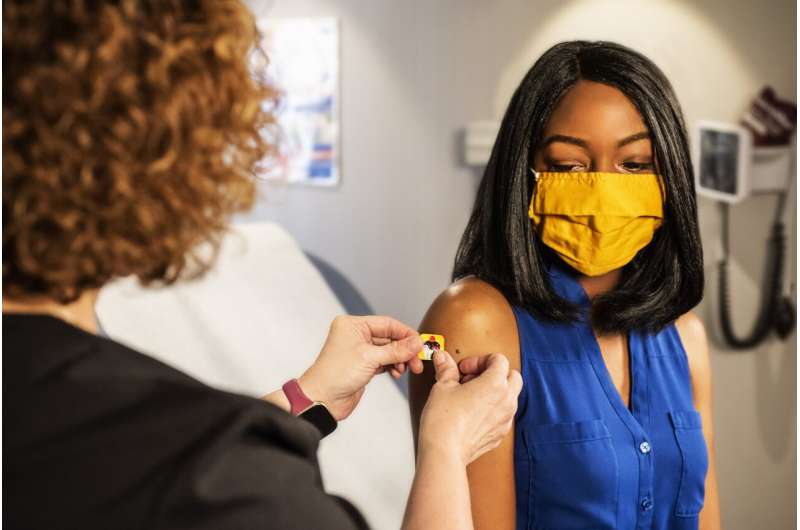
Public confidence in vaccines has plunged across sub-Saharan Africa since the COVID-19 pandemic, according to a study of 17,000 people, across eight countries, published today in the journal Human Vaccines & Immunotherapeutics.
The findings come as the World Health Organization and UNICEF have reported the largest sustained fall in uptake of routine childhood immunizations in three decades. Six million fewer children in Africa received routine shots for diseases including tetanus, polio, diphtheria and measles over the past two years, and rising outbreaks threaten to reverse decades of progress against preventable diseases.
To date, the fall in routine childhood vaccinations was thought to be down to disruption of vaccination programs by the pandemic—however these new findings, which followed a study carried out by a team from London School of Hygiene & Tropical Medicine (LSHTM) and the Africa Centres for Disease Control and Prevention, suggest there could be other possible reasons too.
“Our study paints a worrying picture of declining vaccine confidence trends across many sub-national regions in sub-Saharan Africa, notably in the Democratic Republic of Congo, where confidence losses are particularly large,” states lead author Dr. Alex de Figueirido, a Research Fellow at LSHTM.
The team’s results could be an early warning sign of wider scale loss in vaccine confidence, say the authors. Critically, regional losses in confidence—as seen in this study—could lead to clusters of non-vaccinated people which could have a negative impact on ‘herd immunity’—the point at which a population is protected from a disease, either by enough people being vaccinated or by people having developed antibodies through having the disease.
The research involved face-to-face interviews with over 17,000 adults (an even split of men and women) across eight sub-Saharan African countries: the Democratic Republic of Congo (DRC), Ivory Coast, Kenya, Niger, Nigeria, Senegal, South Africa and Uganda. The experts used sampling methods to ensure an accurate cross section of the population was represented and to gain a picture of vaccine confidence at both national and regional levels.
Interviewees’ age, sex, religion, employment status and highest education level were recorded to help the researchers to analyze whether social background affected confidence in vaccines. The interviews were carried out in 2020 and again in 2022, after the pandemic.
Respondents were asked to say how strongly they agreed with statements such as “Vaccines are important for all ages,” “Vaccines are important for children” and “Vaccines are safe.” They were also asked specifically about COVID-19 vaccines, rating their agreement that COVID-19 vaccines would be important, safe and effective –both before they had been developed (in 2020) and then after they had been developed and rolled out, in 2022.
Findings showed a fall in people’s view that vaccines are important for children across all eight countries between 2020 and 2022, particularly in DRC (20% decline), followed by Uganda (14%) and Nigeria (10.5%). In Nigeria and DRC, public confidence in vaccine safety and effectiveness also declined, and fewer people agreed that ‘vaccines are important for all ages’ in Ivory Coast, Kenya, Nigeria, South African and Uganda.
When it came to COVID-19 vaccines, people thought they were less important in 2022 than they had in 2020 in seven out of the eight countries, with the biggest loss of trust in DRC, South Africa and Uganda. People in DRC, Kenya, Niger, Senegal and Nigeria thought that the COVID-19 vaccine was less effective in 2022 than they had expected it to be in 2020. However, trust in the safety of the COVID-19 vaccine stayed consistent over the two years.
In 2022, the over-60s were more likely than younger adults to agree that vaccines are generally safe, effective and important for children, but no other links were found between vaccine confidence and sex, education, employment status or religious affiliation.
“Early warning signals of confidence losses—such as those detected in this study—can provide time to respond, in the case of other epidemics, pandemics or other emerging crises,” adds co-author, Professor of Anthropology, Risk and Decision Science Heidi Larson, who is the Founding Director of the Vaccine Confidence Project at LSHTM.
“Confidence monitoring at sub-national resolutions can also provide clearer signals to the regions and groups facing confidence losses and can better prepare policymakers and stakeholders for potential losses in vaccine uptake.”
A thorough investigation is now needed to find out whether loss of confidence in COVID-19 vaccines will trigger mistrust of other immunization programs, say the study authors.
“Considering global decreases in routine immunization rates over the past two years, vaccine confidence losses could prove to be highly disruptive at this time when there are concerted efforts to address losses in routine immunization rates post pandemic. We need to understand the impact of the COVID-19 pandemic on confidence in routine immunization programs, not just in Africa, but across the world,” says Dr. Defigueirido.
“Understanding the role of the COVID-19 pandemic and associated policies on wider vaccine confidence can inform post-COVID vaccination strategies and help rebuild immunization system resilience.”
More information:
Declining trends in vaccine confidence across sub-Saharan Africa: a large-scale cross-sectional modeling study, Human Vaccines & Immunotherapeutics (2023). DOI: 10.1080/21645515.2023.2213117 , www.tandfonline.com/doi/full/1 … 1645515.2023.2213117
Citation:
Confidence in vaccines has plummeted in Africa since the pandemic, shows eight-country study (2023, June 8)
retrieved 8 June 2023
from https://medicalxpress.com/news/2023-06-confidence-vaccines-plummeted-africa-pandemic.html
This document is subject to copyright. Apart from any fair dealing for the purpose of private study or research, no
part may be reproduced without the written permission. The content is provided for information purposes only.


